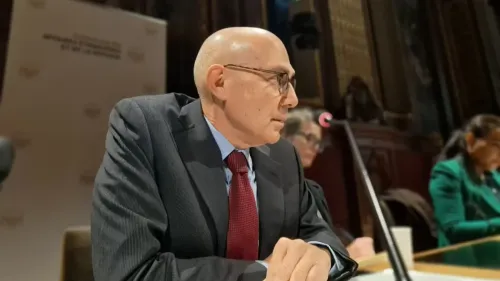US Tariffs Impact Arab Non-Oil Exports: UN Agency

Synopsis
Key Takeaways
- US trade protectionism threatens Arab economies.
- $22 billion in non-oil exports at risk.
- Jordan and Bahrain are the most vulnerable nations.
- GCC economies are facing financial strains.
- Non-GCC countries will incur higher interest payments by 2025.
Beirut, April 20 (NationPress) An increase in US trade protectionism is intensifying the challenges faced by Arab economies, jeopardizing $22 billion in non-oil exports, as outlined in a policy brief by the United Nations Economic and Social Commission for Western Asia (ESCWA).
Jordan stands out as the most susceptible, with about a quarter of its total exports directed towards the United States. Bahrain is also highlighted due to its significant reliance on aluminum and chemical exports to the US market, according to a report by Xinhua.
Simultaneously, the United Arab Emirates may face disruptions affecting approximately $10 billion in re-exports destined for the US, stemming from tariffs on products initially manufactured in third countries, as noted in the brief.
The ESCWA report also cautions about the rising financial pressures on Gulf Cooperation Council (GCC) economies, which are grappling with a significant decline in global oil prices.
Non-GCC nations are also expected to face financial hurdles. The ESCWA anticipates that Egypt, Morocco, Jordan, and Tunisia will jointly incur an extra $114 million in sovereign interest payments in 2025, driven by escalating global bond yields amidst investor uncertainty. These increased borrowing expenses could constrain national budgets and postpone developmental projects, the brief indicated.
Earlier this month, US President Donald Trump enacted an executive order, facing considerable opposition, which imposes so-called "reciprocal tariffs" on its global trading partners.
The US President previously stated that trading partners unable to reach an agreement with the US by July 9, when the 90-day grace period concludes, would see goods entering the US subjected to the initially announced reciprocal tariff rates.
For India, this means that the tariff will revert to 26 percent from the adjusted 10 percent. Similar adjustments apply to other nations that opted to negotiate with the US instead of retaliating with increased tariffs on American goods, such as China.









